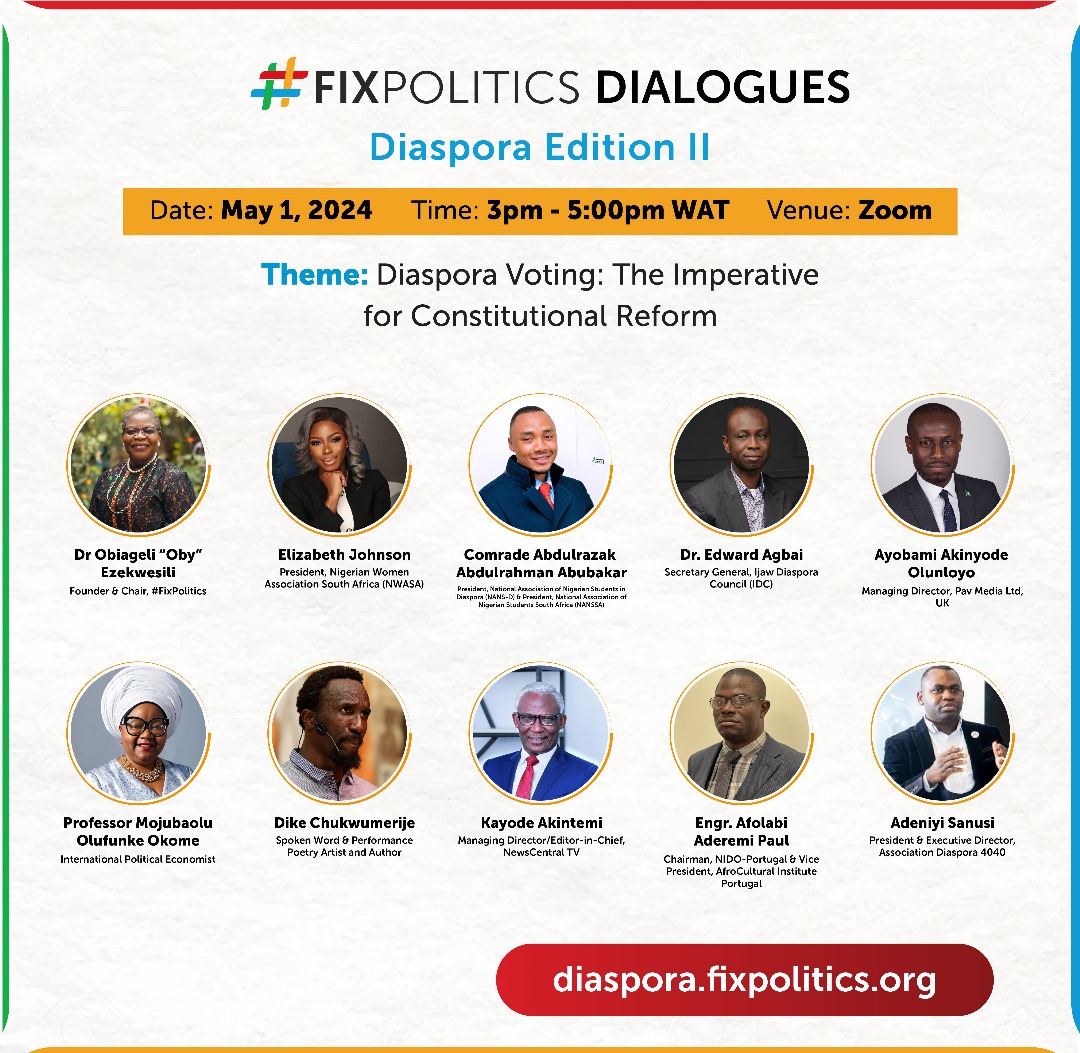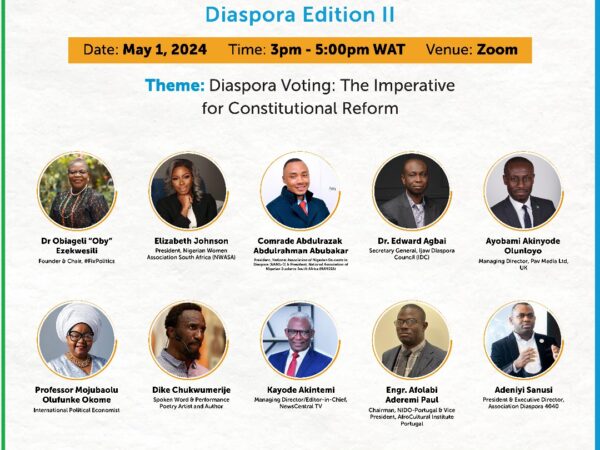
On May 1st, 2024, FixPolitics Diaspora, an initiative of #FixPolitics dedicated to fostering civic engagement among Nigerians in diaspora, hosted the second edition of the Diaspora Dialogue. The virtual event titled “Diaspora Dialogue: An Imperative for Constitutional Reform” brought together Nigerians residing abroad and key figures in Nigeria to discuss the issue of diaspora voting. The event highlighted the growing demand for Nigerians living outside the country to have a say in their homeland’s elections.
The dialogue featured prominent speakers, including Dr. Obiageli Ezekwesili, Founder and Chair of FixPolitics; Mr. Anthony Ubani, Executive Director of FixPolitics; Honorable Abike Dabiri-Erewa, CEO and Managing Director of Nigerians in Diaspora Commission (NIDCOM); Comrade Abdulrazak Abdulrahman Abubakar, Former President of National Association of Nigerian Students in Diaspora and also President of National Association of Nigerian Students in South Africa; Dr. Edward Agbai, Secretary-General of Ijaw Diaspora Council; Ms. Elizabeth Johnson, president of the Nigerian Women Association in South Africa; Ayobami Akinyode Olunloyo, Managing Director of Pav Media Limited, UK; Professor Mojubaolu Olufunke Okome, Professor of Political Science at Brooklyn College, and a host of Nigerians in Diaspora.
The event opened with the Nigerian National Anthem, followed by an introductory speech by Kayode Akintemi, the host/moderator of the event. Prof. Remi Sonaya, Co-Chair of #FixPolitics, did the honours of presenting the welcome address, followed by an opening speech by Dr. Anthony Ubani. In his speech, he cited that the Nigerian Diaspora represents a dynamic and vibrant community spread across the globe, comprising individuals and institutions that remain deeply connected to the Nigerian homeland and are endowed with both financial and intellectual wealth, however, despite their Nigerian citizenship and tremendous capacity to contribute positively to the Nigerian project, Diaspora Nigerians continue to be denied their fundamental right to vote.
“This disenfranchisement not only undermines the principles of democracy but also diminishes the potential for Diaspora engagement in shaping the policies and decisions that impact their lives and the lives of millions of Nigerians back home.”
He concluded by charging Nigerians in diaspora to raise their voice in advocacy.
Keynote Speech by Dr Obiageli ‘Oby’ Ezekwesili
Dr Ezekwesili kicked off the dialogue with a keynote speech explaining the mission of #FixPolitics to address poor governance in Africa through a “triangular pillar” model focusing on empowered citizens, effective regulators, and a responsible political class. She went on to say that Diaspora voting falls within that aspect of the triangular pillars of democracy on the power and the influence of the electorate.
“The reality of our political anomaly is that the supply side of our politics, within the political class, have a monopoly hold on the politics and democracy, not just of Nigeria, but of many other of the act African countries. And that monopoly capture of the political space cannot in any way be contested until we unlock the kind of power and influence that the diaspora community has. The diaspora community cannot be disengaged from the country’s political process.”
She highlighted the significant resources the diaspora community possesses – knowledge, networks, and financial resources – all of which are crucial for development but remain largely untapped due to their exclusion from the political process, and that granting voting rights to Nigerians abroad would be a critical step toward achieving a more inclusive and functional democracy.
“Issues concerning Nigeria matter to them because they have family left behind,” Dr Ezekwesili continued “They also may be temporarily away and will ultimately return to the country. They need to return to a well-governed country. To that extent, the diaspora vote is a very important entry point for activating the voice of the diaspora.”
Presentations and Discussions
Comrade Abdulrazak Abdulrahman Abubakar, former president of the National Association of Nigerian Students in Diaspora, and president of the National Association of Nigerian Students in South Africa, emphasized the need for the diaspora community to have a voice in the electoral process.
Dr. Edward Agbai, Secretary-General of the Ijaw Diaspora Council, made a presentation highlighting the significant size and economic contributions of the diaspora population. He pointed to the growing trend of diaspora voting globally and urged Nigeria to follow suit. Also, he proposed solutions, including constitutional amendments, clear voting procedures, and ensuring the integrity of the process.
Ms. Elizabeth Johnson, president of the Nigerian Women Association in South Africa, addressed the specific challenges women in the diaspora face in voting. She proposed solutions like electronic voting, polling stations at embassies, voter education campaigns, and reserved seats for diaspora representatives in parliament.
Mr. Adeniyi Sanusi, President and Executive Director of Association Diaspora 4040, highlighted instances of disenfranchisement and called for legislative reforms to amend electoral acts and invest in robust voting technology.
Engineer Afolabi Aderemi Paul, Chairman of NIDO-Portugual, and Vice President of Afro-Cultural Institute, Portugal, highlighted failed attempts for constitutional reforms to allow diaspora voting and called for renewed efforts to agitate for the amendment of section 77, to allow Nigerians in diaspora to exercise their fundamental right to vote during general elections.
Honorable Abike Dabiri, CEO of Nigerians in Diaspora Commission (NIDCOM), acknowledged the challenges of implementing diaspora voting, including logistics, data security, and defining who qualifies as a diasporan. She went on to give her recommendations on how diaspora voting can be achieved which include amending section 77, 2 of the constitution that restricts diaspora voting to make it possible, and to clarify who is a diasporan. She also talked about how capturing data of Nigerians in the diaspora is pertinent, so they can be reached if diaspora voting is approved, or in the case of crisis.
“What the diaspora commission has done is come up with a database and we encourage every Nigerian in the diaspora to visit www.nidcom.gov.ng/registry and register their data. All we need is your name and where you stay, so that when the voting starts, your data will be there.”
She also mentioned some initiatives NIDCOM has launched for Nigerians in diaspora “One of the reasons why the diaspora commission came on board is because of the power and the knowledge of the diaspora. So over the years, the diaspora commission has put a lot of programs out there for the diaspora to make things easier for them. Your passports are now easier to get. Now you have a 10-year passport. There’s a diaspora housing program. There’s a diaspora mortgage scheme. Diaspora cities are coming up. So, we’ve been able to do things that matter to the diaspora community.” She concluded by urging Nigerians in the diaspora to come out in their numbers and attend public hearings. She encouraged them to present a united front and make their voices heard. ”
Professor Okome bewailed the disinterest of the Nigerian parliament and the need for electoral reforms to ensure the integrity of diaspora voting,
“There’s a great potential for the diaspora to impact Nigeria’s national development positively. But, I think regardless of all the rhetorical, pronouncements we’ve heard, Nigeria has shown through its actions that it’s either oblivious or it’s greatly disinterested in incorporating whatever political contributions the diaspora can bring to the table. If we legalize diaspora voting, it would not only promote political inclusivity, it would increase voter participation and the quality of discourses that we have about the issues that concern all of us, and it would also enhance Nigeria’s political and socioeconomic development. It might even amp up the remittances that diaspora Nigerians are making because then they have a greater stake in the whole political enterprise of Project Nigeria.”
She cited the laxity of Nigerian government to fulfill the constitutional and institutional reforms needed to achieve diaspora voting “The electoral body has not shown that they can manage diaspora voting. That needs to be addressed. The Nigerian government needs to build the capacity to deliver the dividends of democracy to Nigerians no matter where they are. The issue of electoral integrity is key. Without guaranteeing a free, fair election, neither the elections at home nor those in the diaspora are worth much. The election management body has to be able to deliver reliable election results.”
Ayobami Akinyode Olunloyo, Managing Director of Pav Media Limited, UK, spoke on the political economy of Nigerians in the diaspora “Depending on the source, there are between 15 20,000,000 Nigerians living abroad, and that may seem a small number relative to a population of nearly 230,000,000. However, when expressed as a percentage of voter turnout in our recent elections, suddenly this comparison draws attention.”
He commented that Nigerians in the diaspora want to offer more to the Nigerian state than just remittances
“The diaspora is worth a lot more to Nigeria than what it’s most famous for. We’ve heard a lot about remittances of which an average of $20,000,000,000 is guaranteed to flow from the diaspora to Nigeria annually. But the diaspora that I know is not content with just giving treasure. It is also willing to give time and talent. The diaspora generally is seriously engaged in issues that matter in and for Nigeria.”
Moving Forward
The event concluded with a call to action for Nigerians in the diaspora to show up in their for public hearings on the matter, present a united front, and make their voices heard. FixPolitics plans to compile the suggestions and solutions presented into a document to advocate for changes to the Nigerian constitution that would allow diaspora voting.
The dialogue served as a platform for Nigerians in the diaspora to voice their concerns and propose solutions for achieving their right to vote. The discussions highlighted the need for continued dialogue, collaboration, and political will to make diaspora voting a reality.
Please leave a comment below.

